‘Treating both ends of the leash:' How a new Pittsburgh clinic treats humans, pets
Katana wagged her tail, scuttling tentatively across a Pittsburgh parking lot beside her owner on a warm Thursday in October.
The 4-month-old caramel pit bull mix and her human companion Terrue Scoggins were greeted by a team of health care workers standing around outside a pair of mobile clinics. Scoggins, 41, and Katana were two of the only patients for the day in the lot for Highmark Stadium, the home of the professional soccer's Riverhounds. The glittering Pittsburgh skyline rose above in the background, across the Monongahela River.
Scoggins wore camouflage pants and hauled a large backpack. He works part time in a Pittsburgh bakery and was worried about the cost of getting Katana her routine shots, a particular concern because she had recently had worms. Another puppy he'd had died a couple of days earlier from worms, he said.
The free veterinary clinic helped.
“It would have kind of broke me,” he said as he waited for Humane Animal Rescue of Pittsburgh staff to examine Katana.
Transplant advancement: A high-voltage wire destroyed his face. Doctors just gave him a new one.
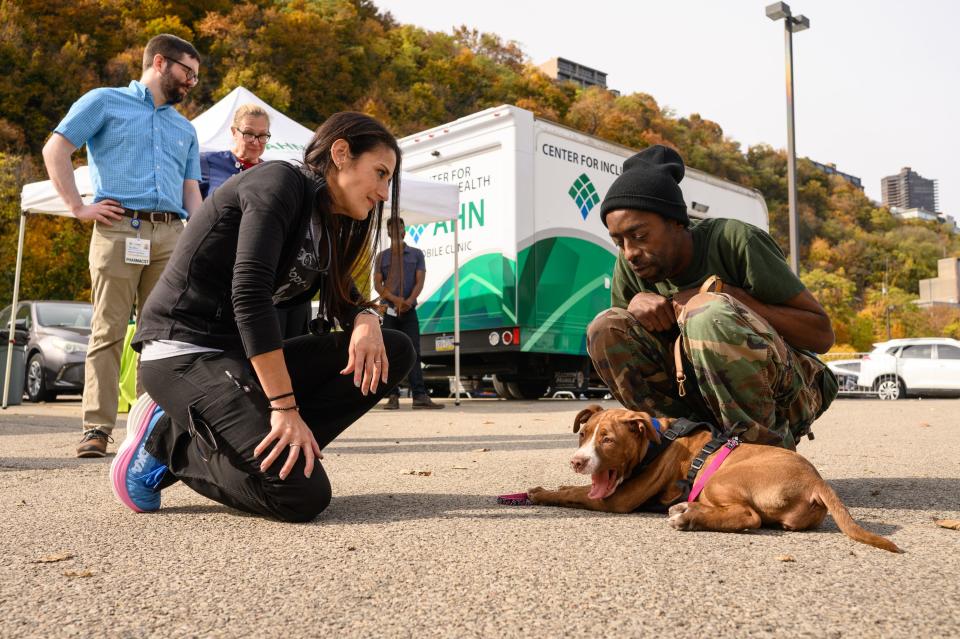
Katana shyly greeted a nurse and a couple of case workers affiliated with Allegheny Health Network, for human care, who gathered around Scoggins, crouching down to pet her before she hustled back to sit between Scoggins' legs. She looked up at them with chestnut eyes.
This was the entry point for the human-focused clinicians – their moment to stand back up, to ask whether Scoggins was up for a health screening, or HIV or hepatitis testing.
By treating pets like Katana, the thinking goes, health workers can also make contact and treat their owners, who might be reticent about the cost of clinic visits and might be more enticed by free pet care than by offers of help with their well-being. The new pilot program in Pittsburgh called the Humane Health Coalition aims to treat people and their pets jointly and for free. It's aimed at patients who might otherwise face barriers in accessing care. Using a public health model that focuses on the relationships between people and their pets, the dual mobile clinics combine primary and veterinary care. The challenge is getting people in the door.
Ice rinks and Kit Kats: After Tree of Life shooting, Pittsburgh forging interfaith bonds
‘Treating both ends of the leash’
The Centers for Disease Control and Prevention's "One Health" model, focused on relationships between people and animals, has been around for decades. Experts have explored the transmission of disease between people and animals for centuries. Today, this can look like a human doctor asking patients whether they have pets, with the understanding that pets can shed germs that may be harmful to people.
Taking that extra step, seeing them both in one place and having these conversations organically, is significant in terms of reaching patients, public health experts say.
“If there are opportunities to bring people in from the community to help meet pets’ needs as well as people’s needs, that can be a very powerful way to protect health overall,” Dr. Casey Barton Behravesh, a trained veterinarian who heads the CDC's One Health Office, told USA TODAY.
She said the COVID-19 pandemic brought on a significant increase in pet adoptions. That’s where the “Healthy Pets, Healthy People” program comes in.
One Health is “treating both ends of the leash,” said Ben Talik, a program manager with Pittsburgh’s Reaching Out on Our Streets, or R.O.O.T.S., homelessness outreach, who spent the day getting people and their pets to the clinic, including with ride-shares. “While you’re here treating your animal,” he said, “let’s focus on you too.”
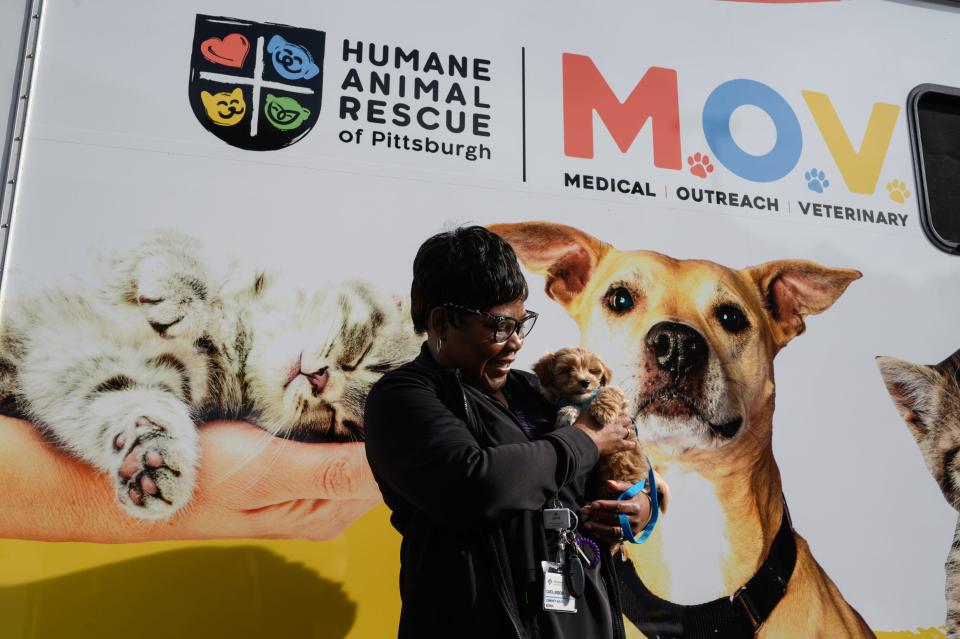
The partnership between primary care providers from the Allegheny Health Network and veterinarians from Humane Animal Rescue began as a conversation about how to provide care to vulnerable Pittsburgh communities, including people who are homeless or don't have stable housing. Pittsburgh has a relatively small homeless population, less than 1,000 people were in shelters or unhoused in January at the latest count.
Talik, who shuttles people to care routinely, said the population fluctuates, growing in warmer months. Many people without stable housing have pets. Many also express they're anxious about accessing hospital services for nonemergencies, and they're even sometimes nervous about interacting with medical providers providing care on the streets, he said.
The people-and-pets partnership program, which is just one month old, began as an appointment-only clinic. The partnership is now trying to identify the best locations for people to attend the free, walk-up clinics.
So far, they've found that by doing outreach jointly with veterinarians, pet owners were more willing to seek human care.
“Health doesn’t exist in a vacuum,” Dr. Louis Weiss, the co-director of the Albert Einstein College of Medicine’s Global Health Center, told USA TODAY. Weiss has studied approaches to the One Health model to better educate doctors on the health and relationships between people and pets and the environment. People are affected by what's going on with the health of their pets, after all, he added.
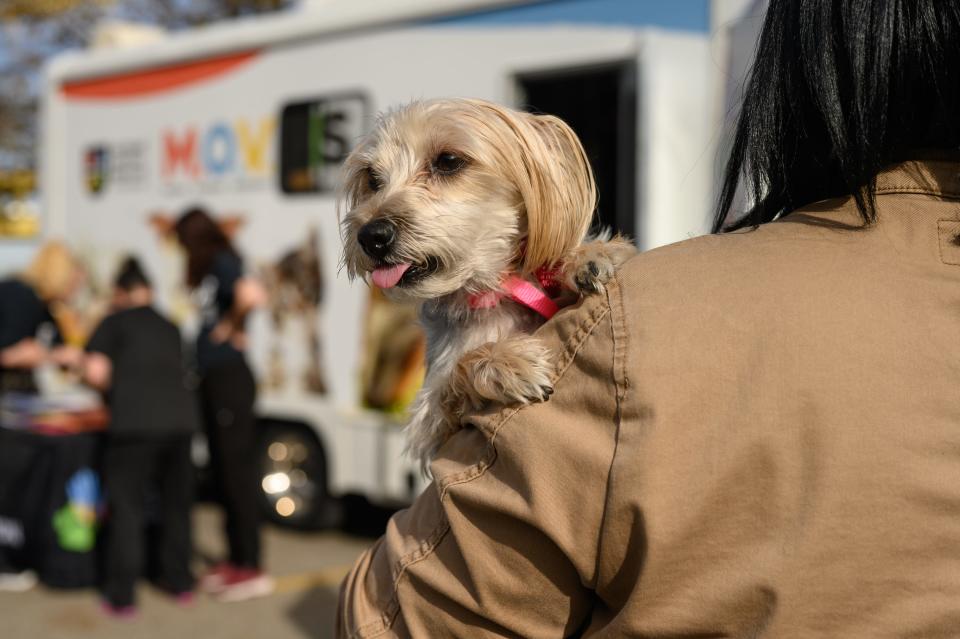
Meeting needs where they are
In scrubs and Hoka running shoes, Dr. Ariella Samson, the executive director of Humane Animal Rescue of Pittsburgh, knelt to check on Katana, who lay at Scoggins’ feet. She lifted Katana’s jowls, examining the pup's baby teeth. Katana would soon start losing her teeth, she told Scoggins.
Samson is excited to be part of this unique program where pet owners will also get their needs met. The Humane Animal Rescue van had flea and heartworm medications, vaccines and spaying and neutering equipment, as well as free food and leashes. In an adjoining mobile clinic, the Allegheny Health Network, for human health, had a registered nurse on-site prepared to conduct screenings, blood pressure checks and testing for HIV and hepatitis C.
“We knew that the people who were experiencing access to veterinary care issues were likely having the same issues in terms of human health care,” Samson said. “By bringing everything together in one place, the goal was to leverage that human-animal bond.”
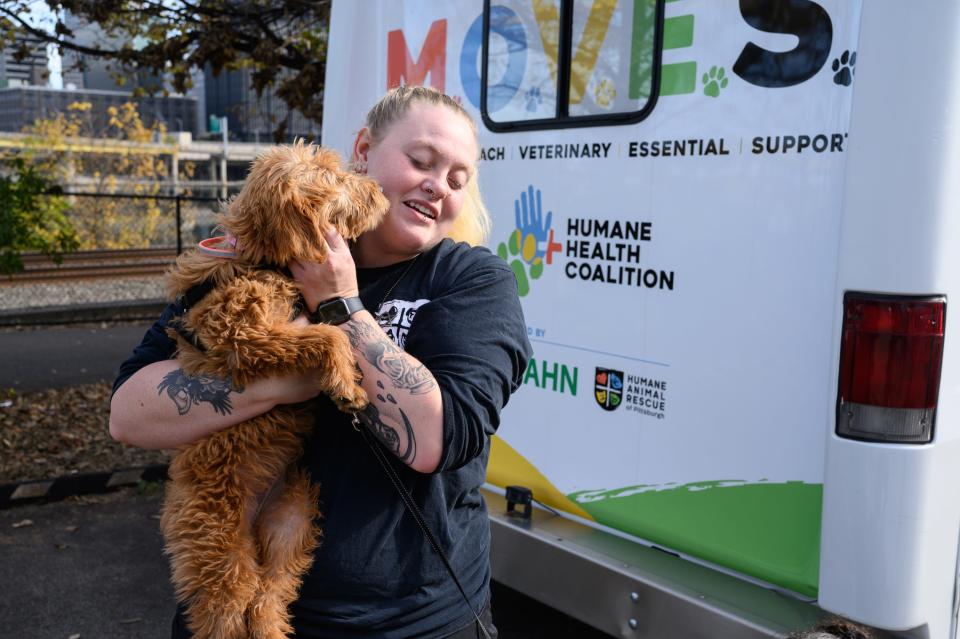
Health care for those who never show up in a clinic
Coco, a 3-month-old black pit bull, was shivering when Jessica Rankin, 47, placed her on the pavement. A veterinary technician brought her a pink leash harnessed on a purple dog vest. In her new fall outfit, Coco warmed up, tail wagging as she tried to cozy up with staff. She got yanked backward each time she ventured beyond the reach of the leash.
“Oh no, I forgot,” Rankin told Humane Animal Rescue workers. “She’s never been on one.”
Coco received her first round of shots for fleas and ticks. Rankin, who was unemployed, had trouble getting care for her dog. She hadn't known about the primary care clinic before she arrived. She ended up not using the human care services.
The Allegheny Health Network van sat empty for much of the day. Staff members from the Center for Inclusion Health, the network’s program aimed at underserved or marginalized populations, handed out information on HIV testing and Narcan, a drug used to reverse opioid overdoses.
Once patients are in the door, human health staff hope they can connect them with health services, such as a regular primary care doctor and information on addiction programs.
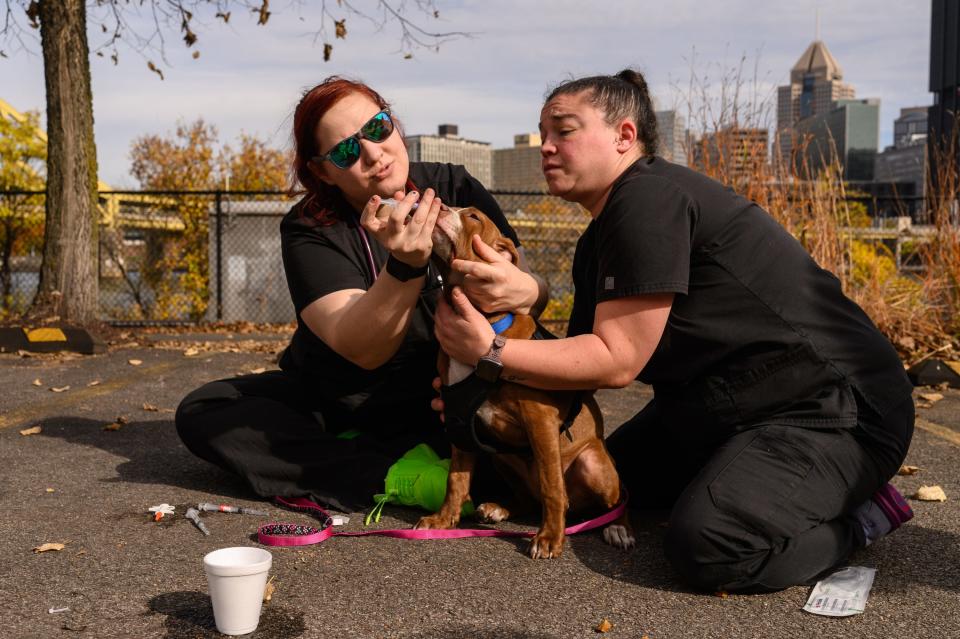
“This clinic should be part of a bigger picture of how we take care of the health of communities,” said Dr. Elizabeth Cuevas, the division chief for the Center for Inclusion and an internal medicine and addiction medicine physician. “It is a way to outreach individuals who sometimes get lost in the community and never actually show up in a health care system.”
After her screening and shots, Katana left the clinic on a pink leash attached to a black harness on her chest. Scoggins, her owner, wanted to weigh her because he thought she was mixed with cane corso, a breed larger than a pit bull. She’d weighed in at 28 pounds, a good size for a growing puppy, he thought.
Scroggins stuffed dog food into his backpack. The pair could now head home. He’d have to return for the following month's clinic for Katana’s next round of puppy vaccines. He told staff he’d like to volunteer since he was good with dogs and he knew how to train them. Maybe at the next visit, too, he might visit the clinic for himself – not just for Katana.
Eduardo Cuevas covers health and breaking news for USA TODAY. He can be reached at EMCuevas1@usatoday.com.
This article originally appeared on USA TODAY: People, pets get health care with new Pittsburgh 'One Health' program

